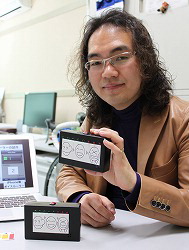Jul 22 2010
Children with ailments typically find it arduous to standardize their voices as per the required levels.

To facilitate them, a new sensor called Hikaru Koe No Monosashi otherwise known as Flashing Voice Meter was contrived.This inimitable machine was fashioned after a research period of 2 years by Tomonori Karita, an associate professor in the Ehime University, Japan.
Karita states that even normal people, in a state of excitement, can lessen their voices if necessary, which is not the case with disabled kids. Their penchant to holler in classes often leads them to trouble and occasionally even other stress induced mental problems.
At present, elementary and special needs teachers employ paper voice meters that indicate voice volume by using five differently colored papers, but this new voice meter allows the children to train themselves by practicing and adjusting their volume levels. It is a plastic box with dimensions of 8.6 by 12.5 cm and is 3.2 cm thick. The color of the LED screen varies depending on the voice level recorded by an embedded sensor. For instance, red indicates noisy, while green means the acceptable level. To make it simpler for the children, Karita has also linked it with three pictures of faces, one with the ears covered, the second a smiling face and the third one struggling to hear below the lights assembly.
According to a Japanese Government survey in 2002, more than 6.3% children of both elementary and high schools may have developmental disorders.